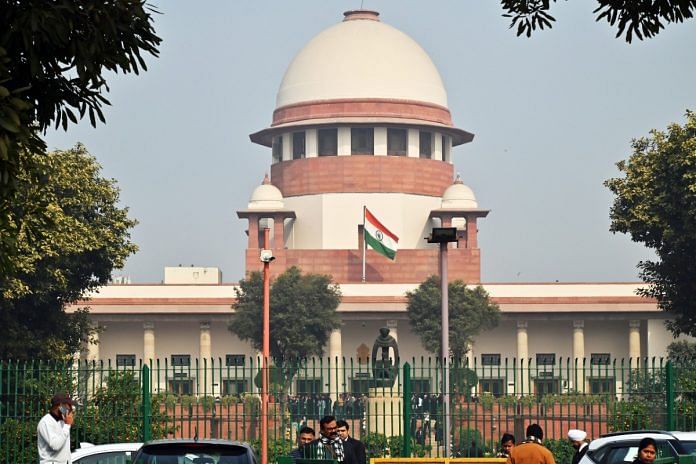New Delhi: The Supreme Court Wednesday declined to entertain a petition filed by 14 political parties that wanted the court to lay down guidelines in view of the alleged misuse of federal probe agencies by the central government against leaders of opposition parties.
A bench led by Chief Justice of India (CJI) D.Y. Chandrachud observed that it is not in the apex court’s jurisdiction to evolve a general principle of application to protect political leaders from arrest, as they do not enjoy any immunity higher than common citizens.
“For us to start laying down guidelines in an abstract context in any case, divorced from the facts of the case is not within the remits of our jurisdiction,” the CJI told senior advocate Abhishek Manu Singhvi, who withdrew the petition after making a brief submission.
The bench further said that if any individual is aggrieved, he/she can approach the court to avail remedies available under the law.
“If an individual comes, we can lay down the law and from there a general principle of application can evolve. Therefore, a judgement delivered in a particular case is not just for that case, but can be applied to others as well. But in the absence of a case, we cannot lay down a general principle of application,” the court said.
The said petition had highlighted the “alarming rise in the use of coercive criminal processes against opposition political leaders and other citizens exercising their fundamental right to dissent”.
It was filed by 14 parties, namely the Indian National Congress (INC), Dravida Munnetra Kazhagam (DMK), Rashtriya Janata Dal (RJD), Bharat Rasthra Samithi (BRS), All Indian Trinamool Congress (TMC), Aam Aadmi Party (AAP), Nationalist Congress Party (NCP), Shiv Sena (UBT), Jharkhand Mukti Morcha (JMM), Janata Dal (United), Communist Party of India (CPI), CPI (Marxist), Samajwadi Party, and the J&K National Conference.
Also Read: ‘National security used to deny citizen rights’ — SC tears into sealed-cover reports, slams govt
‘Ultimately a political leader is also a citizen’
Singhvi presented statistics to assert that prosecution of leaders belonging to opposition parties by the Enforcement Directorate (ED) and the Central Bureau of Investigation (CBI) has multiplied since 2014, when the current regime came into power.
He claimed opposition leaders were named as accused in 95 per cent of the cases filed by ED and CBI between 2014 and now, whereas in the cases registered between 2004 and 2014 — during the Congress-led UPA regime — the scenario was different, with leaders of the ruling party facing relatively more prosecutions.
To substantiate this allegation, Singhvi read out data pertaining to such prosecutions. He claimed the action taken in terms of complaints filed following raids by the two central agencies dropped from 93 per cent in 2005-2014, to 29 per cent in 2014-2022.
According to him, only 23 convictions have been secured by the ED as of now under the Prevention of Money Laundering Act (PMLA), despite a rise in the number of cases registered by the ED from 209 in 2013-14 to 981 in 2020-21, and 1,180 in 2021-22. While 72 political leaders were investigated by the CBI in 2004-14, only 43 were from the opposition. In contrast, 95 per cent of cases are now against opposition leaders, he said.
In ED investigations, the proportion of opposition leaders from the total number of politicians investigated rose from 54 per cent before 2014 to 95 per cent after 2014, he informed the court.
Singhvi urged the bench to lay down guidelines, asking courts to strictly follow the “bail as rule, jail as exception” principle, especially in cases of non-violent offences.
He said bail should be denied only where the triple test is not met. A triple test is when an accused faces flight risk, is in a position to tamper evidence and can influence witnesses.
Singhvi argued that in case a political leader is arrested, he/she should be given bail unless it’s a case involving serious bodily violence. He further contended that the skewed application of the law had resulted in a non-level playing field for opposition parties.
“Leaders are just busy fighting these cases,” he said.
But the bench seemed reluctant to accept the senior advocate’s contention and said the formulation of the petition and its prayers is “extremely broad-based”. Statistics, it added, cannot be a reason to grant immunity to politicians from investigation or prosecution.
“Ultimately a political leader is also a citizen, amenable to the same law as applied to citizens,” the bench observed.
CJI Chandrachud did not accept Singhvi’s proposition to grant bail to political leaders, unless they were involved in a commission of an act where bodily injury or violence is alleged, acceptable.
“If someone collects crores from common pensioners, no payment is made and so multiple FIRs are filed…and the case comes here. Can we say that there can be no arrest here? Once we accept that political leaders are absolutely on the same footing as common citizens with no higher immunity, then how can we say there can be no arrests unless there is a three-pronged test which is satisfied,” he asked Singhvi.
(Edited by Amrtansh Arora)






